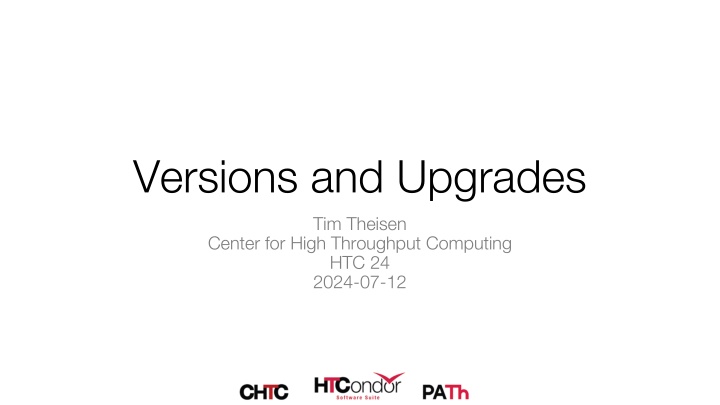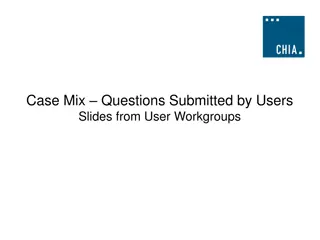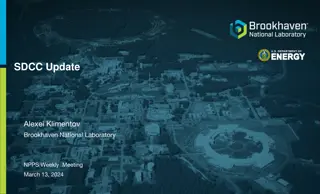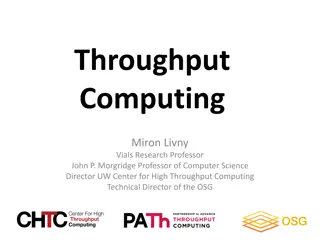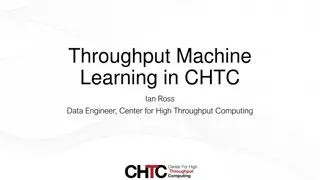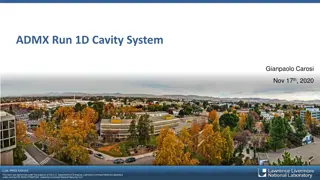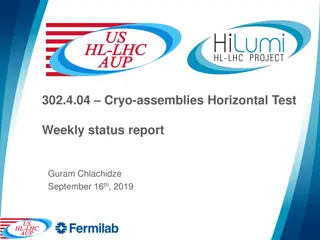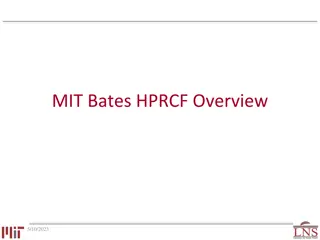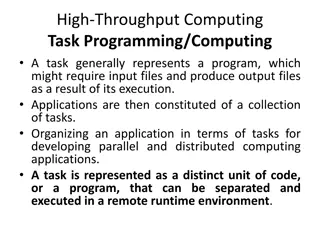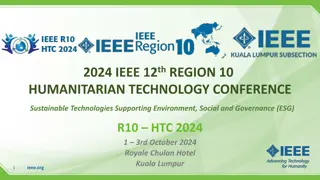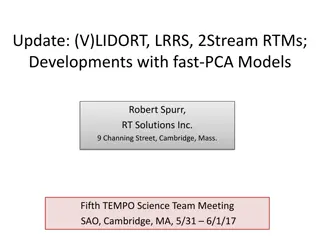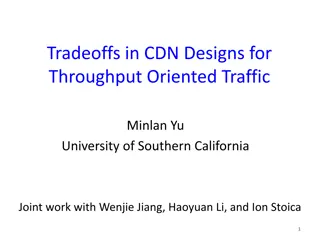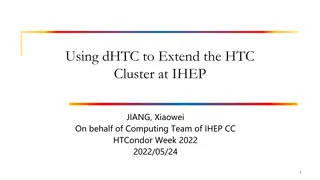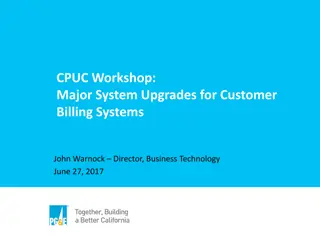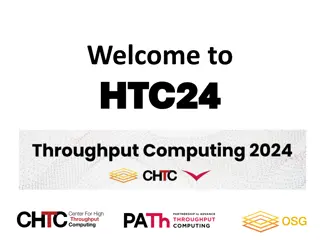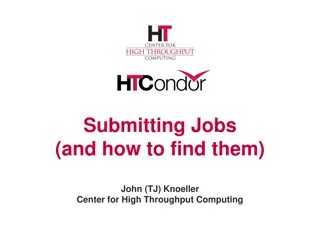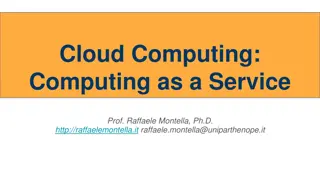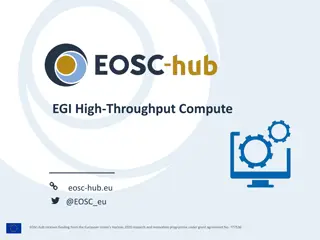Managing Versions and Upgrades at the HTC Center for High Throughput Computing
This documentation covers the version control practices, upgrade processes, and support life cycles for software components including HTCondor and OSG at the HTC Center for High Throughput Computing. It details the compatibility considerations, version numbering conventions, and the current support status for different software versions.
Download Presentation

Please find below an Image/Link to download the presentation.
The content on the website is provided AS IS for your information and personal use only. It may not be sold, licensed, or shared on other websites without obtaining consent from the author.If you encounter any issues during the download, it is possible that the publisher has removed the file from their server.
You are allowed to download the files provided on this website for personal or commercial use, subject to the condition that they are used lawfully. All files are the property of their respective owners.
The content on the website is provided AS IS for your information and personal use only. It may not be sold, licensed, or shared on other websites without obtaining consent from the author.
E N D
Presentation Transcript
Versions and Upgrades Tim Theisen Center for High Throughput Computing HTC 24 2024-07-12
Overview PATh Versions Support Life Cycle Repositories and Tarballs Retention Policies CentOS 7? Upgrades
HTCondor and OSG Release Manager I am responsible for overseeing the testing and release of HTCSS and OSG software. I update the HTCondor Software on the CHTC and Build and Test pools. I am on the lookout for problems in release candidates. I view every commit that goes into the HTCSS code. I write the release announcements and ensure that the documentation and version history is up to date for each release.
HTCondor and OSG PATh Versions Last year: HTCondor 10.6.0 & 10.0.6, HTCondor-CE 6.0.0, OSG 3.6 It's hard to tell which versions should be used together. Different support life cycles. With PATh we unified the version numbers and support life cycle Current: HTCondor 23.8.1 & 23.0.12, HTCondor-CE 23.0.8 (soon 23.8.1 as well), OSG 23 & OSG 23-upcoming
What's in a Number? We pattern our version numbers after semantic version numbers https://semver.org/ First number (Major version) Year of initial release (e.g 23) Second number (Minor version) 0 - LTS release >0 - Feature release Third number (Patch version) 0 - Testing >0 - Could be: testing, final release, patch release For HTCondor 24, we will release 24.0.x and 24.x.y around the same time (The divergence in x in 23 caused confusion)
Version Compatibility We strive to maintain backward compatibility (however, older versions may not be able to take advantage of newer features) Guarantees: 23.0.x is compatible with any 23.0.x (LTS, bug fix only) 23.x.y is compatible with any 23.0.x (We test for compatibility) Main pool: feature CM, APs, EPs with a few AP and EP LTS nodes Our Build and Test pool: LTS CM, feature AP, mix of EP nodes Since 24.0.1 is the culmination of the 23.x work, 24.0.x is compatible with any 23.0.x In practice, the OSPool still has some 10.9.0 EPs and 9.0.x APs
HTCSS and OSG Support Life Cycle Currently: 23.x is under active development and is fully supported 23.0 is getting regular bug fixes and is fully supported 10.0 is getting security and critical bug fixes only When HTCondor 24.0 is released: 24.x will be actively developed and fully supported 24.0 will get regular bug fixes and will be fully supported 23.0 will get security and critical bug fixes only So, each LTS version gets about two years of support
HTCSS Repositories and Tarballs Four different places to get our software: daily: most current HTCondor build (passed unit tests, no integration tests), Use at your own risk, not in production rc: HTCondor build being tested in CHTC, (integration testing underway), Use at your own risk, not in production update: HTCondor build being tested on the OSPool, Feel free to test these builds release: Final HTCondor releases The repositories definitions contain all four. However, everything except release is disabled or commented out.
HTCSS repo migration to OSG repos HTCondor 23.0 daily repo migrates to osg-development HTCondor 23.0 rc repo does not migrate HTCondor 23.0 update repo migrates to osg-testing HTCondor 23.0 release repo migrates to osg-release HTCondor 23.x daily repo migrates to osg-upcoming-development HTCondor 23.x rc repo does not migrate HTCondor 23.x update repo migrates to osg-upcoming-testing HTCondor 23.x release repo migrates to osg-upcoming-release
Retention Policies As long as practical, we keep release repositories and tarballs for the last release of each LTS version online. (Currently, we have versions back to 8.8) Previous versions in the manual are still online. Links from old release announcements still work. (Going back to 8.8 as well) HTCondor LTS versions are retained in PyPI as well (going back to 8.8) OSG 3.6 repositories will be available for at least a year.
Retention Policies (cont.) The daily repositories and tarballs may be removed once a newer version appears. The rc repositories and tarballs may be removed after two newer versions appear. The update repositories and tarballs may be removed after two newer versions appear. To clarify the roles of repositories and tarballs in HTCondor 24: The daily repository will be renamed snapshot The rc repository will be renamed chtc The update repository will be renamed rc
What about CentOS 7? Many, many sites have not migrated away from CentOS 7. We need to support our community, but still gently nudge them in the right direction. Luckily, even though CentOS 7 repositories have been taken down, we can still build HTCondor for CentOS 7. However, external packages such as apptainer and pelican will not be updated in the tarballs. So, CentOS 7 packages and tarballs will still be built for HTCondor 23.x and 23.0. However, CentOS 7 packages will not be available in HTCondor 24.0 and 24.x.
Upgrades: Feature vs LTS Versions We encourage you to update to the latest feature version. We run this in production at CHTC. This is an ideal place to use new features and give us feedback. We have LTS versions that only receive bug fixes. You should update annually with the help of the condor_update_check script.
Upgrades When updating from one LTS to the next LTS, please read the section on upgrading: https://htcondor.readthedocs.io/en/latest/version-history/ It enumerates new features and "gotchas" Use the condor_upgrade_check script in the condor-upgrade- checks package. It's not dependent on a specific version of HTCondor. It checks for issues that need to be addressed before the update.
Special Upgrade Considerations When moving a CM to a new machine Bring $(SPOOL)/Accountantnew.log to the new CM If enabled, offline ads should be brought over as well When moving an AP to a new machine Bring $(JOB_QUEUE_LOG) to the new AP Otherwise, users will need to resubmit their jobs
Handling Configuration during Transition The configuration language allows one to conditionalize the configuration based on HTCondor version. if version >= 24.0.0 DO_X = True else DO_Y = True endif Hopefully, you won't need to use this.
Preferred Upgrade Order Is there a preferred order? Not really. Common sense: Update the CM, update APs, then update EPs Cautious upgrade: (I use this approach for my feature version testing) 1. Update a few test APs and EPs and run "Hello, World!" jobs on same version and cross versions (both feature and LTS). 2. Update CM and non-essential APs, and EPs (18 hr drain, via shutdown_graceful_timeout) 3. Update essential APs with manual restart and another EPs 4. Update EPs one day and another EPs the next day Carefree upgrade: (I use this approach for my LTS testing) Update everything all at once
Questions? Feedback welcome at tim@cs.wisc.edu or htcondor-users@cs.wisc.edu
